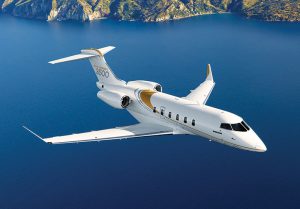BLOOMBERG
When Eric Martel returned to Bombardier Inc in the spring of 2020, the company was hardly recognisable from the one he’d left five years earlier.
Bombardier had just sold its two biggest divisions, which built commercial jets and trains, in a desperate, sell-anything-you-can effort to raise money. A new viral disease called Covid-19 was ripping around the globe, forcing governments to lock down and throwing the economy into recession. Bombardier’s factories went silent.
“The company was in a very, very precarious situation,†Martel, 55, said during an interview in a lounge overlooking the firm’s jet finishing plant, near Montreal’s international airport.
His task is no longer merely to keep the aerospace firm solvent. It’s to convince investors he has a credible plan for real growth, whatever happens in the economy. Bombardier announced more ambitious financial targets, aiming for at least $9 billion in revenue and $900 million in free cash flow in 2025. That’s up from previous goals of $7.5 billion and $500 million, respectively.
The shares jumped as much as 9% before closing up nearly 3% in Toronto trading. They’ve risen about sixfold since Martel took over as chief executive officer, a relief rally as the company made progress on paying down its towering debts. “We hit the bottom of the slope in 2020, and we are going back up,†he said.
Bombardier’s slide towards the brink of bankruptcy was triggered by its decision to challenge Boeing Co and Airbus SE with the C Series commercial aircraft program. The project became a sinkhole: development costs went way over budget at $6 billion and the company was forced to offload it to Airbus, which renamed the jet the A220.
That was merely one stage in a yearslong fire sale that also led Bombardier to announce the divestiture of its train-making division to France’s Alstom SA in early 2020. Soon after, Alain Bellemare departed as CEO.
It was up to Martel to finish the Alstom deal and two others and get the cash in the hangar. “There were three major transactions that were put into question in the context of Covid,†he said. But Martel, an electrical engineer by training, had one major advantage as he refocused the shrunken, demoralised firm around a much smaller business — selling private jets to the wealthy and corporations. He had run that business during his first stint with Bombardier. “My learning curve was fast.â€
He ended production of the small cabin Learjet, betting instead on mid- and large-size private jets, the Challenger and the Global. In May, the Global 8000, was introduced in the market as the fastest business aircraft at an operating top speed of about 720 miles an hour and an $81 million price tag.
To increase revenue, the manufacturer has also reinvested in after-market service by expanding facilities, and now it’s looking to bolster its defense unit, which converts jets into military aircraft. Goldman Sachs analyst Noah Poponak said Bombardier’s management team has done a “great job†improving operating performance, margins and cash flow.
Martel told investors there are no plans for a new aircraft by 2025 that could cost billions to develop.
 The Gulf Time Newspaper One of the finest business newspapers in the UAE brought to you by our professional writers and editors.
The Gulf Time Newspaper One of the finest business newspapers in the UAE brought to you by our professional writers and editors.
